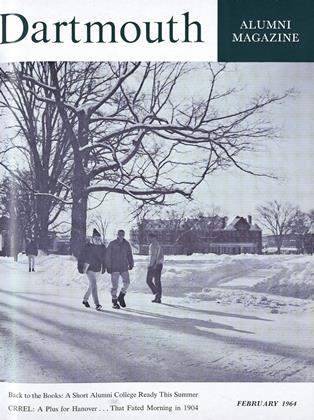When the students return from the March respite with their surf or ski tans, they will find the campus of the College blended subtly and imaginatively into "The World of William Shakespeare." The two-month program planned by the College to honor the Bard on the 400 th anniversary of his birth sweeps beyond the limits of that great playwright-poet's days and over the boundaries of Elizabethan England to embrace a century (1550-1650) of rich and varied achievement in the history and culture of Western Europe.
"Even these dates do not bound the program," Prof. John L. Stewart, Associate Director of the Hopkins Center and the program's coordinator, has written. "Life in Shakespeare's time contained many medieval elements, consideration of which may take us back to Aquinas and beyond, and inevitably we shall want to inquire into the significance for our own age of Shakespeare's image of man."
The goal is to provide an "understanding and appreciation of the age and some of its masterworks . . . enriched by recognition of broad cultural patterns that were present in human affairs," but not as an offering of capsulated knowledge or in handsome generalizations. "We hope that the elements of the program will furnish material and suggest topics for close scrutiny and discussion by the students in courses and elsewhere," Professor Stewart wrote.
What are these "elements"?
PLAYS: Shakespeare's Richard theThird; The Bride from Mantua, a verse adaptation by Richard Eberhart '26 of Lope de Vega's El Castigo Sin Venganza.
CONCERTS: the Old North Singers in a concert that will include Elizabethan madrigals; Pro Musica of New York in a program of Elizabethan instrumental and vocal music; Michel Podolski, lutenist; and the Handel Society program of Vaughn Williams' "Serenade to Music," written for The Merchant of Venice, and music by Henry Purcell.
LECTURES : director Tyrone Guthrie on directing Shakespeare; Prof. G. B. Harrison, the outstanding American authority on the social life of the Elizabethans, on Elizabethan England; Noah Greenberg on Elizabethan music; Prof. William Guerlac of Cornell on the impact of science on the culture of Western Europe, 1550-1650, with special attention to Galileo; Prof. John V. Falconieri of Western Reserve University on the corrales, the small Spanish theaters of Lope de Vega's day; poet Richard Eberhart on adapting The Bride from Mantua to English rhymed verse; Dr. Richard B. K. McLanathan on Baroque art; James Card on Carl Dreyer's Hamlet film; Prof. Robert Albion of Harvard on navigation and the great explorers of the period; Prof. Hans Baron of the Newberry Library on Petrarch; Prof. Gareth Davies on Lope de Vega and the literature of the Golden Age (Gongora, Cervantes, Calderon).
These special lectures will be complemented by course lectures by members of the Dartmouth faculty.
FILMS: Olivier's Richard the Third; Dreyer's Hamlet; Throne of Blood, a Japanese film on the theme of Macbeth; Olivier's Henry the Fifth.
EXHIBITIONS: Pascal; Lope de Vega; Four Centuries of Theatre Design; pictures and facsimiles of English music and musicians; materials related to daily life in Elizabethan England; Shakespeariana; paintings and sculpture of the period.
The student who takes in everything about "The World of William Shakespeare" may have problems — keeping up with his regular courses!
 View Full Issue
View Full Issue
More From This Issue
-
 Feature
FeatureThe Fated Morning
February 1964 By HAROLD F. BRAMAN '21 -
 Feature
FeatureBACK TO THE BOOKS
February 1964 By R.J.B. -
 Feature
FeatureThe Cold, Cold World of CRREL
February 1964 By CLIFFORD L. JORDAN '45 -
 Feature
Feature$44,180,240 and How It Grew
February 1964 By FORD H. WHELDEN '25 -
 Article
ArticleTHE UNDERGRADUATE CHAIR
February 1964 By DAVE BOLDT '63 -
 Class Notes
Class Notes1936
February 1964 By BARRY C. SULLIVAN, E. JAMES STEPHENS JR.







